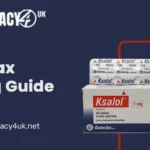Introduction to naltrexone 4.50mg extremely tired
Naltrexone, a versatile medication, is widely recognized for its role in managing alcohol and opioid dependence. However, at a lower dosage of 4.50 mg, it has found off-label use in addressing chronic pain, autoimmune disorders, and more. Despite its benefits, one common side effect reported by users is extreme tiredness or fatigue. Understanding the causes of this fatigue, how to manage it, and when to seek professional advice is crucial for those using Naltrexone 4.50mg. This comprehensive guide aims to shed light on these aspects, offering insights and practical tips to help individuals cope with the side effect while maximizing the benefits of the medication.
What is Naltrexone 4.50mg and How Does it Work?
Naltrexone is primarily known as an opioid antagonist designed to block the euphoric effects of opioids and ultimately reduce cravings. At its standard higher doses, it is used to aid in alcohol and opioid addiction treatments. However, at a lower dosage of 4.50 mg, it is often referred to as Low Dose Naltrexone (LDN) and serves various off-label purposes.
Off-Label Uses of Naltrexone 4.50mg
The use of LDN has been explored in treating conditions such as chronic pain, multiple sclerosis, and other autoimmune diseases. The lower dose is believed to modulate the immune system and reduce inflammation, providing relief to patients who may not respond well to traditional therapies.
Mechanism of Action at Lower Doses
At 4.50 mg, Naltrexone is thought to temporarily block opioid receptors in the brain, leading to a rebound effect that increases the production of endorphins. This boost in endorphins reportedly helps alleviate pain and improves mood, making it an attractive option for various conditions beyond its original scope.
Understanding the Link Between Naltrexone and Fatigue
When taking Naltrexone 4.50mg, many users report experiencing fatigue. It’s essential to understand why this occurs and how it can affect one’s daily life.
Causes of Fatigue from Naltrexone
The primary reason for fatigue may be related to the adjustment period your body goes through when starting the medication. Naltrexone affects neurotransmitter levels and hormonal balance, which can lead to feelings of tiredness as your body adapts.
Another potential cause could be related to how the medication interacts with your sleep cycles. Some users report disturbances in their sleep patterns, leading to non-restorative sleep and subsequent fatigue during the day.
How Naltrexone Affects the Body
Naltrexone’s mechanism involves altering the endorphin levels in the body, which can impact energy levels and overall vitality. The initial phase of taking the medication might result in lowered energy as the body adjusts to these changes.
Understanding these potential effects is the first step in managing fatigue while on Naltrexone. Knowing what to expect can help individuals better prepare for and cope with any tiredness they may experience.
Managing Fatigue While on Naltrexone 4.50mg
While fatigue can be a side effect of Naltrexone, there are effective strategies to help manage it. Adopting certain lifestyle adjustments can make a significant difference.
Sleep Hygiene
Improving sleep hygiene is essential for combating fatigue. This includes maintaining a regular sleep schedule, creating a restful environment, and avoiding stimulants like caffeine before bedtime. By prioritizing good sleep habits, individuals can improve their overall restfulness and energy levels.
Regular Physical Activity
Incorporating regular physical activity into your routine can help combat fatigue. Exercise boosts endorphin levels naturally, leading to increased energy and improved mood. Even light activities like walking or stretching can have a positive impact on energy levels.
Monitoring Symptoms
It’s crucial to keep track of any fatigue-related symptoms and progress. Maintaining a journal to log sleep patterns, daily activities, and energy levels can help identify patterns and areas for improvement.
When to Seek Professional Advice
While fatigue is a common side effect, there are instances where it may indicate more serious issues. Knowing when to seek professional advice is vital for ensuring your health and well-being.
Red Flags to Watch For
If fatigue is accompanied by other concerning symptoms such as severe dizziness, shortness of breath, or changes in mental clarity, it’s essential to consult a healthcare professional promptly.
Consulting a Healthcare Provider
Open communication with your healthcare provider is crucial for managing fatigue effectively. They can provide personalized advice, adjust dosages, or explore alternative treatments if necessary.
Community Insights Real Stories and Tips
Real-life experiences from individuals who have taken Naltrexone 4.50mg can offer valuable insights and practical tips for managing fatigue.
Personal Stories
Many users have shared their journeys of adjusting to Naltrexone and overcoming fatigue. These stories provide motivation and reassurance to those just starting their treatment.
Practical Tips
Community members often suggest strategies that worked for them, such as incorporating mindfulness practices, staying hydrated, and adopting a balanced diet to boost energy levels.
YOU MAY ALSO LIKE: “Springhill Clinical Gathering: Comprehensive Healthcare Solutions for All Your Needs”
Conclusion
Understanding the intricacies of Naltrexone 4.50mg and its potential side effects, like fatigue, empowers individuals to make informed decisions about their treatment. By exploring the causes of fatigue, implementing effective management strategies, and seeking professional advice when necessary, users can continue to benefit from this medication while minimizing its impact on daily life. Remember, everyone’s experience with Naltrexone is unique, so it’s essential to tailor approaches to suit individual needs and circumstances.
FAQs
1. Can Naltrexone 4.50mg cause extreme tiredness?
Yes, some users report fatigue as a side effect of Naltrexone 4.50mg.
2. How long does fatigue from Naltrexone last?
Fatigue typically improves after the initial adjustment period, which varies per individual.
3. Are there specific strategies to manage Naltrexone-related fatigue?
Yes, improving sleep hygiene and staying physically active can help alleviate fatigue.
4. When should I seek medical advice for fatigue on Naltrexone?
Consult a healthcare provider if fatigue persists or is accompanied by severe symptoms.
5. Can other medications interact with Naltrexone to cause fatigue?
Yes, inform your doctor about all medications you’re taking to assess potential interactions.










